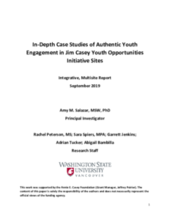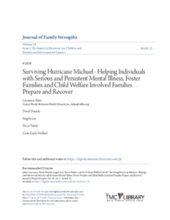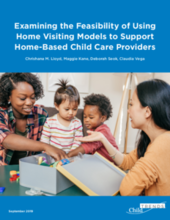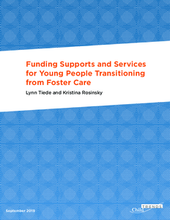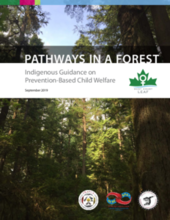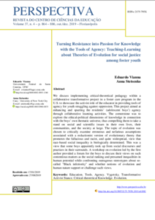Displaying 111 - 120 of 437
The purpose of this study is to synthesize and share the Jim Casey Youth Opportunities Initiative’s approach to youth engagement. The study’s findings communicate how authentically engaging youth can help both the Jim Casey Initiative and youth-serving systems achieve their desired results.
This article highlights the experiences of staff who responded to the needs of individuals, families, and communities following Hurricane Michael in Florida, USA in October 2018 and is focused on the perspectives of individuals working in the field.
To help increase the college preparation of local foster youth in a Midwestern city in the US, the authors developed a working group comprised of foster youth nominated by agency staff, staff from a university research center that sponsored and coordinated the program, local community leaders who work with foster youth, and city government representatives.
This report examines home visiting models and curricula, state- and federal-level policies related to early care and education and home visiting, funding streams to support early care and education and home visiting, and the perspectives of home-based child care (HBCC) providers and parents in order to explore the potential for scaling up this model of professional development for HBCC providers in the United States.
This report draws on interviews the authors conducted with 19 child welfare leaders in eight jurisdictions to highlight how jurisdictions are using existing funding sources to serve this population and examine the funding challenges they continue to face.
This report explores the experiences of 64 Indigenous parents who have had engagement with the child welfare system in Canada. Their stories and expertise provide a wealth of knowledge about the strengths and weaknesses of current prevention-based eff orts and programs. Their experiences demonstrate that, despite the Ministry for Children and Family Development’s (MCFD) emphasis on improving prevention-based services for Indigenous families, long-standing apprehension-focused practices continue to permeate the system.
The authors of this article discuss implementing critical-theoretical pedagogy within a collaborative transformative project in a foster care program in the U.S. to showcase the activist role of the educator in providing tools of agency for youth struggling against oppression.
This study tested a web‐based parenting course called FosterParentCollege.com (FPC) Culturally Competent Parenting (CCP) for transracial foster and adoptive parents.
In this case study, the authors address a critical component of health care delivery for a vulnerable population by describing a process of developing an information sharing system between health care and child welfare organizations in collaboration with child protection community partners in the US.
The National Quality Improvement Center for Adoption and Guardianship Support and Preservation (QIC-AG) is a five-year project working with eight sites that will implement evidence-based interventions or develop and test promising practices which if proven effective can be replicated or adapted in other child welfare jurisdictions. This webinar presented learning from the project related to staffing and staff support, recruitment and retention, cost/sustainability, stakeholder collaboration, and logistics.

